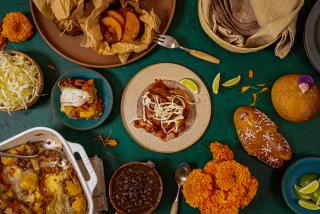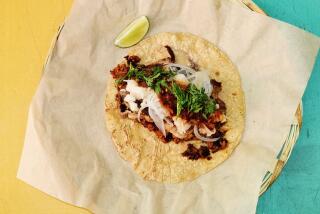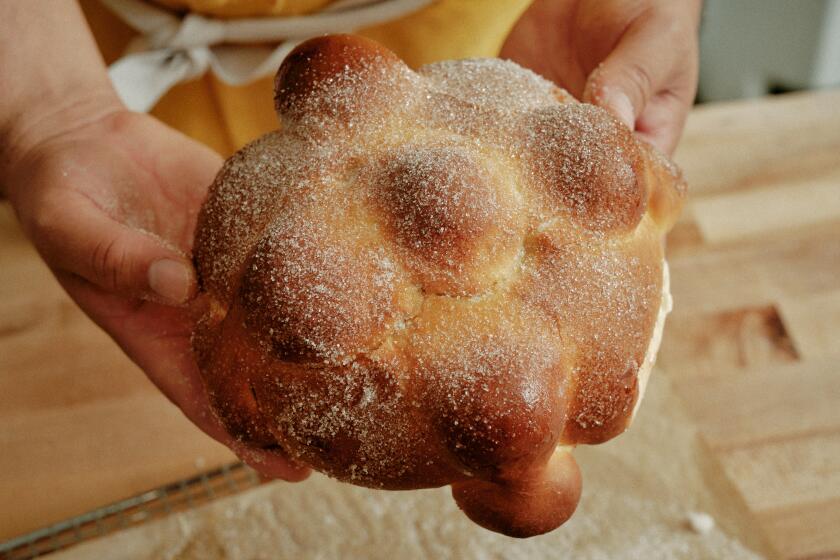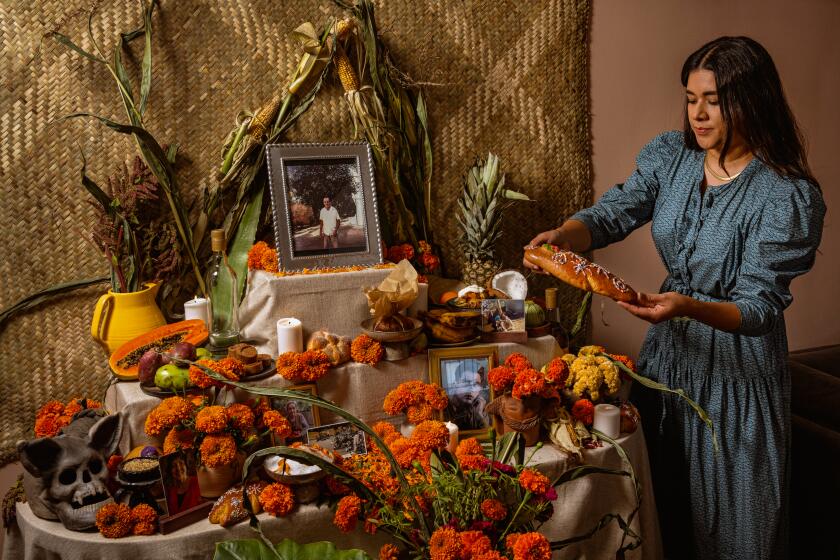Fresh Take on Fowl Tradition
For most Americans, the Thanksgiving turkey hunt starts and ends by opening a supermarket freezer door and heaving a shrink-wrapped bird reminiscent of a cannonball into a shopping cart.
But when it came time for Olga Barrientos to buy the poultry that would serve her party of eight Thursday, she went to Morsy Farm, an unassuming, single-story building on the corner of 69th Street and South Central Avenue that looks more like a burger joint than a slaughterhouse.
Wearing elegant high heels, Barrientos walked into the unbearable stench Tuesday, past cages stacked six high with chickens and rabbits, to the back of the business where a chain-link pen held nearly 200 turkeys.
“Get me a small one,” she said in Spanish.
An employee wearing a rubber apron grabbed a spry-looking turkey by the ankles and passed it to a co-worker, who then electrocuted the clucking bird, slit its throat and dumped it into scalding water before it was machine-plucked and cleaned. Five minutes later, Barrientos had a lukewarm, 12-pound turkey for $18.
For many Latin and Asian immigrants, this is the recipe for a happy Thanksgiving.
“The flavor is fresher,” said Barrientos, 34, a native of Guatemala who buys her turkey at the shop every year. “It’s just better.”
It is this loyal clientele that has kept owner Samy Morsy in business since he opened in 2002. Thanksgiving? Well, that’s gravy. Business picks up during the holidays, but his core business is selling live chickens and the occasional rabbit.
Almost all his customers are working-class Latin Americans, who prize the freshness of his chickens and their reasonable prices year-round. A family of six can be fed with a six-pound bird for less than $10.
Most of the customers talked glowingly Tuesday of how they would cook their turkeys. Guatemalans spoke of a stuffing made of pork and mirepoix. Salvadoran cooks said they would bast their turkeys in a tomato sauce with garlic, chilies, pumpkin seeds and sesame seeds.
Morsy also is an immigrant. He came to the United States in 1994 from Egypt, where he was a police officer. His brother, who was in the abattoir business back home, opened a poultry shop on the corner of Alameda Street and Florence Avenue and taught Morsy the trade.
Today, Samy Morsy is so deft with his 12-inch chef knife that it seems that he could turn a turkey into a hood ornament if he were asked to.
With his rail-thin body and leathery face, the 50-year-old Morsy always seems to be clutching the next cigarette he’s going to smoke. His visage instantly brightens when a customer, often with children, walks in.
“Buenos dias,” says Morsy, who has learned enough Spanish to converse with his regulars, most of whom seem immune to the sickly sweet smell.
Asked about it, Morsy smiled and said, “Smell? After two or three days working here, you can’t tell the difference between inside and outside.”
Morsy spent $150,000 to outfit the building with equipment and cages. The plumbing system that funnels blood and waste to a tank cost $50,000. After the birds are killed with an eight-volt electric knife, they’re placed into a tub of scalding water. The tub looks like a stainless steel Jacuzzi that appears to fill up with yellow soup and feathers as the day goes on. The animals are then tossed into what can be best described as a lidless spin dryer. Feathers go flying from holes cut out of the sides.
The waiting area by the entrance displays a spice rack, a refrigerator with soda and a freezer with ice-cream bars. Two windows provide a view of the birds in their cages. Chickens and turkeys sit behind glass and a free-standing cardboard advertisement for an ice-cream drumstick.
Two Muslim women walked in and went out back, carefully surveyed the white turkeys and chose two 13-pounders.
Morsy, who is trained in the preparation of halal meat, brought the birds inside and brandished his gleaming, 12-inch knife. Then he bent one of the turkey’s necks backward. He slit its throat, saying a few Arabic words, “Allahu Akbar.”
The women, who declined to give their names, said they were making a traditional American meal with stuffing and pumpkin pie.
As for Morsy, his Thanksgiving dinner will include a Middle Eastern spiced lasagna and mashed potatoes. But that’s all the detail he had.
“I don’t go into the kitchen,” he said. “I don’t know what goes on in there.”
Though ethnic families have long adopted Thanksgiving as their own, they also have used the best of their own cuisines to solve the age-old conundrum of turkey -- a bird oft-criticized for dryness and flavorlessness. Though Latin Americans combat the flavor issue by buying the freshest birds possible, chefs in Chinatown have been applying their expertise in roasting meats to the Pilgrim favorite.
At Hop Woo, owner Lupe Liang (his first name was given to him when he lived in Mexico) has his chefs prepare turkey the same way they would cook a Chinese roast duck.
That means dunking it in a rich marinade spiked with star anise, two different kinds of vinegars and a sweet syrup. The result is a golden turkey, or fo gai. He sells about 200 of them during the holiday season for about $38 each. Trimmings include giblet gravy and pungent garlic fried rice.
“When I first started selling turkey 13 years ago, I’d be lucky to sell 10 or 15 of them,” Liang said in Cantonese.
“Now, everyone wants to be part of the American tradition,” he said. “I roast it standing up with its head facing down so the juices stay.”
Liang said a third of his customers are white, a third are Asian and the rest are Latino. The shop on North Broadway is open Thanksgiving from 10 a.m. to 1 a.m. and will have turkeys precooked for walk-up customers.
“It’s like Chinese New Year for Americans because it’s a big family reunion,” Liang said.
More to Read
Eat your way across L.A.
Get our weekly Tasting Notes newsletter for reviews, news and more.
You may occasionally receive promotional content from the Los Angeles Times.











